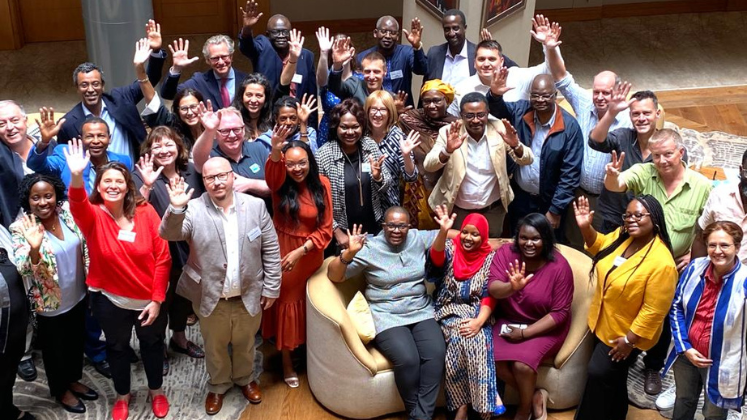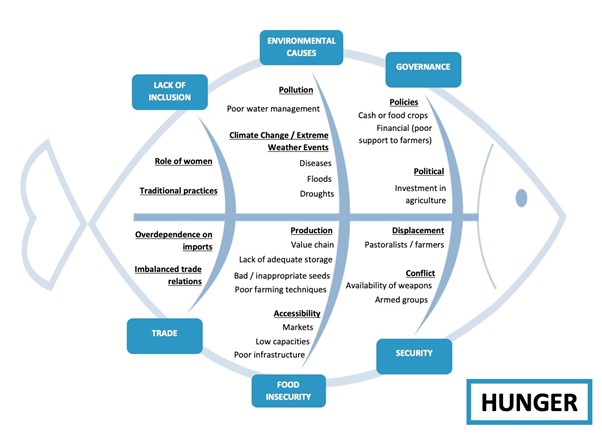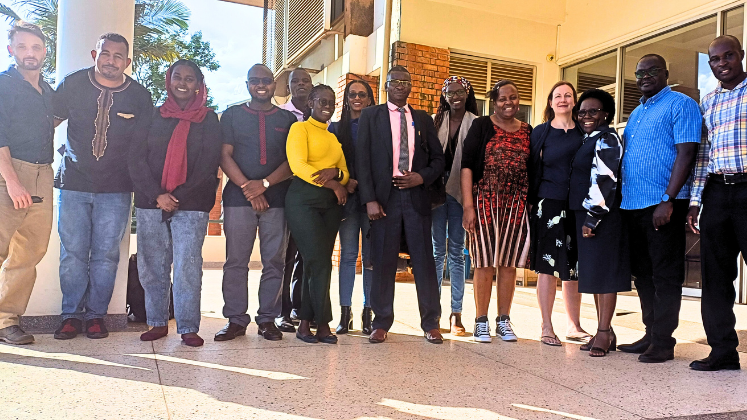Global Executive Leadership Initiative on humanitarian influencing
Funded by UNOPS and co-directed by Dr Tom Kirk and Dr Duncan Green.
The Global Executive Leadership Initiative’s influencing course is for senior leaders in the aid sector. The purpose is to improve the overall quality of executive leadership in humanitarian and development operations around the world and in particular the capacity of leaders to effectively advocate and influence stakeholders.
 The starting point, as one senior UN diplomat put it is that aid sector workers ‘get promoted for being good at organising tents and blankets, and then suddenly we are supposed to stop the Saudis from bombing Yemen.’
The starting point, as one senior UN diplomat put it is that aid sector workers ‘get promoted for being good at organising tents and blankets, and then suddenly we are supposed to stop the Saudis from bombing Yemen.’
The course is focused on three pillars of analysis, strategy, and practice and involves a combination of in-person and online teaching. The curriculum focuses on media engagement, strategic communications, and other techniques informed by evidence generated by CPAID research.
Participants are led through a series of stages to design effective strategies to bring about ‘intentional change’.
- Analysing the problem (below is an example breaking down the causes of hunger in East Africa) to identify promising ‘points of entry’ for influencing
- Using stakeholder maps of the power and the level of interest of the different actors that circle those points of entry
- Using that analysis to build a plausible ‘theory of change’, usually combining elements of private and public influencing.

The course is funded by the United Nations and aid organisations and has so far been through 10 cohorts of 25 participants each. Each course has a four-day face-to-face session in a regional hub, followed by six weeks of online activity.
The participants have upwards of 20 years of experience, especially in the world of humanitarian response, which poses an interesting challenge for LSE ‘teachers’. With each successive cohort we’ve ended up teaching less, and facilitating conversations between the participants more, and the results have been fascinating.
Duncan’s been blogging about the programme on From Poverty to Power, here, there’s also a series of podcasts ‘Geli stories’ of real-life influencing by senior UN and NGO figures.
Public authority and humanitarianism course
Directed by Prof Tim Allen, Dr Naomi Pendle & Dr Tom Kirk
This course was developed for early and mid-career scholars, humanitarian, and development professionals based in the global south. The course is eight weeks long and free of charge to participants.
 Delivered in a combination of online and in-person teaching, the course brings together participants to discuss their experiences of responding to humanitarian challenges while working for international and civil society organisations. It explores topics such as public authority, security, and ethics and is assessed by participation and a policy essay.
Delivered in a combination of online and in-person teaching, the course brings together participants to discuss their experiences of responding to humanitarian challenges while working for international and civil society organisations. It explores topics such as public authority, security, and ethics and is assessed by participation and a policy essay.
For more information, read about this year’s course.
Academic to policy writing workshops
Researchers at CPAID run workshops in Africa to strengthen the research and communication skills of doctoral students, early career researchers, and practitioners.
In total, over twenty early career researchers from Kenya, Uganda, and South Sudan have attended these courses. The second workshop prompted a range of papers on different questions surrounding public authority.
In eastern Democratic Republic of Congo, Patrycja Stys and Tom Kirk delivered workshops on research methods and social science practice. Sessions in Bukavu and Goma addressed population enumeration, cognitive interviewing, and social network research, including training in social services mapping and innovative methodologies such as financial diaries. A further short course in collaboration with Mercy Corps focused on practitioners and graduate students in Goma.
In partnership with the University of Sierra Leone and the London School of Hygiene and Tropical Medicine, CPAID’s Tim Allen, Melissa Parker, Georgina Pearson, Jonah Lipton, and Liz Storer ram a week-long writing workshop at Njala University. Focussed on developing articles for publication, the workshop created a space for early-career scholars from across Sierra Leone to produce work rooted in personal experience or ongoing projects.
FLIA also ran a course in partnership with the Global Initiative Against Transnational & Organised Crime Academic-Policy Nexus Writing Workshop Series (GI-TOC). The workshop consisted of four online sessions focused on academic writing, publishing, and blogging for impact. The attendees were GI-TOC professionals from all career stages who were eager to publish their research on organised crime in Africa. Co-produced blogs on organised crime were co-published on the Africa@LSE blog and GI-TOC’s blog.